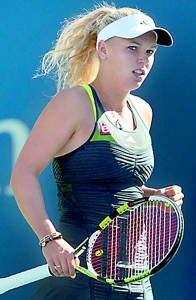Roads less travelled
This year will see a few more additional international and local tournaments, before the close of the long competitive season. But of course, for the enthusiast, the tennis season never ends. For them any good afternoon is for Tennis.
I am of the opinion that the 2013 competitions would inspire and make aware salient aspects of survival. The interest to develop is not only for the young but for all those who play Tennis. Working on stroke making directly can become cosmetic but emphasis on effective game-making aspects will enhance the skills. Game-making approach to play Tennis gives ‘purpose’ to stroke making. The season will give administrations many leads to develop the game. This responsibility is not only for the national systems but also for parents, clubs, coaches and above all the players.
‘Doubles’ in development
New comers in the international tour this year, showed all court stroke-making ability. I followed two matches closely and found strong emphasis of ‘doubles’ in their development. It has given them the ‘comfort zone’ for an all-court game. Reason? Doubles enables forward movement and demands all court stroke-making ability. Two major advantages come off doubles in development. Having the support of a partner, court becomes manageable to venture into forward movements. Secondly, doubles emphasizes on ‘positional play’. By positioning well, a player can take away the opponent’s easy shot advantage. Positioning also enhances player’s own shots tactically after the shot. This idea has lost much of its ground in the recent times in our local scene. I would go to the extent of saying, it is gone altogether. If there is a third advantage playing doubles, it is ‘good reaction.’ It is a product of quick assessment of situations and responding to it.
Doubles extends a tennis career
Doubles has shown another very interesting aspect. Rohan de Silva and Rajeev Rajapakse of the local scene still play competition doubles. The well known Leander Paes of India and others, to the mighty Martina Navratilova have extended their competition career through doubles. It does not demand the rigid training disciplines as singles, which means little more fun. It is an option for Federer now and I feel he should step into doubles. He should not go, Tennis needs Federer. Navratilova played doubles approaching 50 years of age.
‘Back court book-keeping’
An ex-German international explained to me that junior singles has become a business of ‘back court book-keeping’. Most juniors have a simple serve [in fact too simple], a forehand, backhand and nothing more. With this limitation they can only wait behind the baseline for an opponent’s mistake. Good players do not make mistakes and they hit winners at the first opportunity. So ‘back court book keeping’ as development, will not give good wins. There is no better way to cause stress oriented injuries to joints, ligaments and spine than hitting thousands of shots very hard from behind the baseline. Andy Murray is going into back operation and will not play the rest of the season. A study could follow subsequently. He has an effective game but is a back court player. Back court play results in long matches and are a stress for beginners. Juniors by 15 years and adults after two years will ‘face the wall’ if an all court game is not developed. Inability to register success after 16 years of age is called ‘facing the wall situation’ in sports jargon.

Caroline Wozniacki
Exposure for development
It is not easy to understand what is implied by Exposure. If a player is getting running instructions during training the chances are, none of it will be retained by the player and match play will be ineffective. Am I making ‘training’ look bad. It is not so. Training must be limited, strictly in match conditions. If a player is getting exposed to match play situations, development is taking place. That is exposure. Good tournament tour of 5 tournaments matures and teaches a player to retain more than two years of ‘clock’ oriented training. Group training is ineffective after 12 years of age. [Many a group training is like placing a car in the parking lot, nothing would change] Group training is for team sports for player interactions. Best exposure is away from home tournament experience. Exposure educates, thereby matures playing skills. Another good exposure is the cross training. That is doing other sports. It is far more rewarding than isolated physicals and yoga like mental training. Federer among men and Caroline Wozniacki among women played a lot of football. Nadal’s coach and uncle is a reputed Football coach. All these should give an idea what exposure means.
Watch out for drop-out syndrome
Tennis experiences the highest drop-out rate in sport development. Most of the development roads in Tennis are arrangements of convenience than time tested paths. It is a major factor for drop-out syndrome in Tennis development. Promoters and sponsors of players do not want to see players before 16. At that age, stroke makers fade away and game makers survive and prosper. Often stroke makers are those who took the wrong road in development for early success. Grigor Dimitrov of Bulgaria entered ATP top hundred at the age of 20. In recent time this is the youngest entry into the top 50 of the ATP ranking. Caroline Wozniacki of Denmark, coming from a sports family turned pro at 15 years in 2005. She was number one and this year due to injuries she has dropped to 8. Tennis is an individual game demanding individual-based development – an absolute need. It is still a less known road even now. Those who take it make it and reach the sky.
<George Paldano, former international player; Accredited Coach of Germany, ITF and USPTR; National, Davis Cup and Federation Cup Coach –
georgepaldano@yahoo.com>


